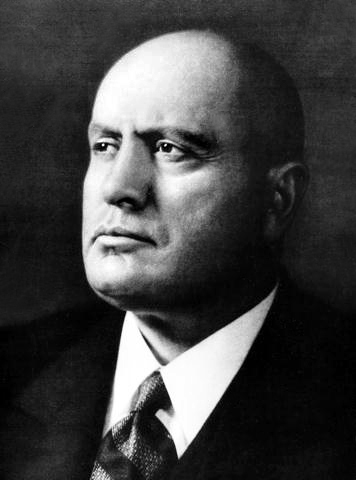“I don't like the look of him.”
To his aide after Mussolini's first encounter with Hitler (1934), as quoted in The Gathering Storm (1946) by Winston Churchill
1930s
Benito Mussolini bol vodca talianskeho fašizmu a v rokoch 1922 – 1943 fašistický diktátor v Taliansku. Wikipedia

“I don't like the look of him.”
To his aide after Mussolini's first encounter with Hitler (1934), as quoted in The Gathering Storm (1946) by Winston Churchill
1930s
“Marx was the greatest of all theorists of socialism.”
As quoted in Mussolini: A Biography by Denis Mack Smith (1983) p. 7. Original source: Opera Omnia di Benito Mussolini (OO) 1/102-3 (14 Mar. 1908), 135, 142.
1900s
“Religion is a species of mental disease. It has always had a pathological reaction on mankind.”
As quoted by Mussolini in 2000 Years of Disbelief: Famous People with the Courage to Doubt by James A. Haught (1966) p. 256. From a speech he made in Lausanne, July 1904.
1900s
Speech to the National Corporative Council (November 14, 1933), in A Primer of Italian Fascism, edited/translated by Jeffrey T. Schnapp (2000) p.163.
1930s
As quoted in Talks with Mussolini, Emil Ludwig, Boston, MA, Little, Brown and Company (1933) pp. 70-71. Mussolini’s interview was in 1932.
1930s
Popolo d'Italia (Feb. 1, 1921), quoted in The Menace of Fascism, John Strachey (1933) p. 65
1920s
As quoted in Il Duce: The Life and Work of Benito Mussolini, L. Kemechey, New York: NY, Richard R. Smith (1930) p. 54. Written just before taking editorship of the Italian Socialist Party newspaper Avanti in 1912.
1910s
“It is blood which moves the wheels of history.”
Speech in Parma (13 December 1914) quoted in Foreign Affairs, May 1924, p 234 https://books.google.com/books?id=DsRYAAAAMAAJ&pg=RA1-PA234&lpg=RA1-PA234&dq=%22It+is+blood+which+moves+the+wheels+of+history!%22&source=bl&ots=v0BzInFnc_&sig=gEqKCdgCipviuomrOppXZrk6E_E&hl=en&sa=X&ved=0ahUKEwjgtZuZvY_ZAhXJmeAKHWwWB_EQ6AEIUTAG#v=onepage&q=%22It%20is%20blood%20which%20moves%20the%20wheels%20of%20history!%22&f=false
1910s
“Declaration of War on France and England,” Mussolini Speech on June 10, 1940
1940s
As quoted in The Myth of the Nation and the Vision of Revolution, Jacob Talmon, University of California Press (1981) p. 494, Mussolini's declaration near the end of 1921
1920s
“What is freedom? There is no such thing as absolute freedom!”
As quoted in " Eja! Eja! Alala!" in TIME magazine (23 July 1923) http://www.time.com/time/magazine/article/0,9171,716187,00.html
1920s
Diuturna [The Lasting] (1921) as quoted in Rational Man : A Modern Interpretation of Aristotelian Ethics (1962) by H. B. Veatch
1920s
My Autobiography , New York: NY, Charles Scribner’s Sons (1928) p. 280
1920s
Speech given by Mussolini to a group of Milanese Fascist veterans (October 14, 1944), quoted in Revolutionary Fascism, Erik Norling, Lisbon, Finis Mundi Press (2011) pp.119-120.
1940s
From Jane Soames’s authorized translation of Mussolini’s “The Political and Social Doctrine of Fascism,” Hogarth Press, London, (1933), p. 20. http://historyuncensored.wixsite.com/history-uncensored http://media.wix.com/ugd/927b40_c1ee26114a4d480cb048f5f96a4cc68f.pdf Julius Evola reproduced the original Italian as "un secolo della 'Destra" ("a century of the right"); see Evola, Fascismo e Terzo Reich. Several English translations agree with Evola's wording, including one published by the Fascist government in 1935 and transcribed online. http://www.worldfuturefund.org/wffmaster/Reading/Germany/mussolini.htm
Attributed
This quote spread rapidly in the United States after appearing in a column by Molly Ivins (24 November 2002). It is repeated often and sometimes attributed to the "Fascism" entry in the 1932 Enciclopedia Italiana. However hard copies of the 1932 Enciclopedia Italiana exist in numerous libraries and the alleged quote is not in the text, nor is there anything that would support the alleged quote. A vaguely similar statement does appear in Doctrine of Fascism.
We are, in other words, a state which controls all forces acting in nature. We control political forces, we control moral forces, we control economic forces, therefore we are a full-blown Corporative state.
The same document explains that the "corporations" (corporazioni) on which the Fascist state rested were its own creations, modeled on guild associations and not private companies, which Italian normally calls società. For details see "Mussolini on the Corporate State" http://www.publiceye.org/fascist/corporatism.html by Chip Berlet.
Attributed
My Autobiography, New York, C. Scribner's Sons, 1928. Reprinted in Benito Mussolini, My Rise And Fall, Volumes 1-2 Da Capo Press, 1998 (p.40).
1920s
Speech at the Italian Socialist Party’s meeting in Milan at the People’s Theatre on Nov. 25, 1914. Quote in Revolutionary Fascism by Erik Norling, Lisbon, Finis Mundi Press (2011) p. 88.
1910s
Remark to Galeazzo Ciano (11 April 1940), quoted in Famous Lines : A Columbia Dictionary of Familiar Quotations (1997) by Robert Andrews. p. 330
1940s
"The Doctrine of Fascism", June 1932. Quoted in Marco Piraino, Stefano Fiorito, Fascist identity : political project and doctrine of fascism. Lulu.com, 2009. (p. 107)
1930s
As quoted in “The Political and Social Doctrine of Fascism”, Jane Soames translator, Hogarth Press, London, authorized edition (1933) p. 23
1930s
As quoted in Italy: A Modern History, Denis Mack Smith, University of Michigan Press (1959) p. 352, Pact of Pacification, 1921
1920s
As quoted in The Tyrants: 2500 Years of Absolute Power and Corruption (2006) by Clive Foss ISBN 1905204965
Undated
Speech at Udine (September 20, 1922) "The Question of Regime. The Monarchy and Fascism," quoted in A History of Civilization (1955) by Crane Brinton, John B. Christopher, and Robert Lee Wolff, p. 520
1920s
“Religion: Benito a Christian?” Time magazine (August 25, 1924)
1920s
As quoted by Mussolini in 2000 Years of Disbelief: Famous People with the Courage to Doubt by James A. Haught (1966) p. 256. Originally came from Mussolini’s essay l'Homme et la Divinité, 1904.
1900s
As quoted by Mussolini as leader of the Revolutionary Fascist Party (1919) in Fascism and Big Business by Daniel Guerin (1973) p. 83. From article in Mussolini’s Popolo d’Italia on June 19, 1919.
1910s
“Inside every anarchist is a failed dictator.”
Quote from The Golden Book Magazine Vol. 16 (1932), p. 206 translated from what Mussolini said to Emil Ludwig (Colloqui con Mussolini, 1932)
1930s